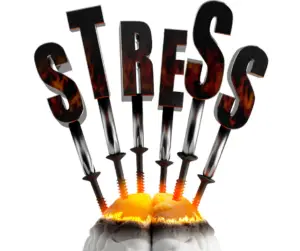Feeling Overwhelmed and Stressed All the Time?
Do you ever feel like life is an endless juggling act, and you’re just one dropped ball away from losing it completely? Work demands, family responsibilities, and endless to-do lists—it all adds up. If you constantly feel on edge, mentally exhausted, and emotionally drained, your body might be sending you a clear message: it’s time to calm the nervous system.
When your sympathetic nervous system (a.k.a. your fight-or-flight mode) is constantly in overdrive, it’s like being a tightly wound rubber band that could snap at any moment. And we totally understand—that’s not a place you want to be.
The good news? You can absolutely learn how to calm the nervous system and regain a sense of peace and balance.

Stress is Rewiring Your Nervous System
Here’s the thing: when stress is constant, it doesn’t just make you feel tired—it physically rewires your brain and nervous system. Over time, your autonomic nervous system (ANS), which controls your body’s unconscious processes, can get stuck in fight-or-flight mode, making it difficult for your parasympathetic nervous system (your rest-and-digest mode) to step in.
In this stressed-out state, your heart races, your breath shortens, and you find it hard to concentrate or sleep. It’s no wonder people often say they feel like they’re running on empty!
So, what’s the solution? How do you hit the “reset” button on your nervous system and get back to feeling like yourself again?

Master How to Calm the Nervous System with Long Exhale Breathing
One highly effective and natural way to regain control is through Long Exhale breathing—a simple yet powerful technique that you can do anywhere, anytime. Long Exhale breathing is a method of intentionally slowing your breathing and focusing on making your exhale longer than your inhale. Sounds simple, right? That’s because it is.
But here’s the magic: this technique directly stimulates your vagus nerve, which is like your body’s built-in chill button. By activating the vagus nerve, you’re encouraging your parasympathetic nervous system to step in and help you calm down.
How Long Exhale Breathing Works to Calm the Nervous System
When you breathe in, your heart rate naturally increases as your sympathetic nervous system gets involved. During a long, slow exhale, however, the vagus nerve sends signals to your heart to slow down. This shift helps your parasympathetic nervous system take the wheel, creating a sense of relaxation.
Benefits of the Inhale and Exhale on Your Nervous System
- Inhale: Momentarily activates the sympathetic nervous system, preparing your body for alertness.
- Exhale: Encourages the parasympathetic nervous system to take over by releasing acetylcholine, a neurotransmitter that reduces heart rate and promotes relaxation.
In essence, Long Exhale breathing gives your body the signal to slow down and enter rest-and-digest mode. It’s like telling your brain, “Hey, we’re safe now—you can chill.”

Proven Benefits of Long Exhale Breathing
Now, you might be wondering: “Does this really work?” And the answer is a resounding yes. Research supports the effectiveness of this simple technique in reducing stress and improving overall well-being.
1. Comprehensive Review (2018)
A Dutch study reviewed various breathing techniques and confirmed their benefits on physical, mental, and cognitive health. Researchers highlighted how controlled breathing stimulates the vagus nerve, promoting relaxation. Check out the study.
2. Two-Study Analysis on HRV (2018)
An international research team analyzed how slow breathing impacts heart rate variability (HRV) and perceived stress. Participants practicing slow breathing saw improved HRV metrics, reduced stress, and better decision-making. Read the full study.
3. Insights from an Endurance Athlete
World-class endurance athlete Christopher Bergland dubbed longer exhales as an “easy way to hack your vagus nerve.” Learn more from Bergland.
This evidence shows that mastering how to calm the nervous system with Long Exhale breathing can have a positive impact on your mental and physical health.

How to Calm the Nervous System with Long Exhale Breathing
Ready to get started? Here’s a step-by-step guide to mastering this technique:
- Inhale Gently: Start with a slow, gentle inhale that feels comfortable. Aim for about four seconds.
- Exhale Slowly: Gradually extend your exhale to be around twice the length of your inhale. If you inhaled for four seconds, exhale for eight.
- Keep It Short if Needed: Even two minutes of focused breathing can reduce stress, but aim for longer sessions when you can.
- Add an Audio Guide: If you struggle to stay focused, use an audio guide that paces your breathing. You can even listen while working or scrolling through your phone.
Pro Tip: Practice Anywhere
The beauty of Long Exhale breathing is that it’s discreet and can be done anywhere. Use it:
- At Home: Start your day with a calming breath or wind down before bed.
- At Work: Take a quick breathing break between tasks to stay centered and focused.
- On the Go: Use it while sitting in traffic, waiting in line, or commuting.
No special equipment or setup is needed—just you and your breath.

Power Pairing Long Exhale Breathing with IASIS MCN to Calm The Nervous System
At Clear Mind Utah, we combine IASIS Microcurrent Neurofeedback (MCN) with techniques like Long Exhale breathing to provide a comprehensive solution for achieving mental clarity, emotional balance, and stress relief.
Why It’s a Winning Combo
- Long Exhale Breathing: Calms the nervous system by stimulating the vagus nerve, helping you relax.
- IASIS MCN: Uses gentle electrical impulses to reset unhelpful brain patterns, promoting better mental function.
Together, these approaches help you create long-lasting powerful changes in how you respond to stress and improve your overall well-being.
Learn More About Our Services
For more tips on improving your nervous system health, check out our article on “What is IASIS MCN?” or explore the “Benefits of Neurofeedback”. And if you’re curious about how these techniques can help you specifically, don’t hesitate to schedule a free consultation with us.

Final Thoughts: Calm The Nervous System and Reclaim Your Peace
Learning how to calm the nervous system isn’t just about reducing stress in the moment; it’s about creating a healthier, more balanced life. By mastering Long Exhale breathing and pairing it with IASIS Microcurrent Neurofeedback, you can regain control of your mental and emotional well-being.
If you’re ready to take the next step, schedule a free consultation with Clear Mind Utah today and discover how these techniques can help you feel more calm, focused, and confident in your everyday life.






